Getting Started With Marketing KPI Dashboards
We’re in 2022 and everything in our world has sped up. Decisions, be they of any sort, have to be taken quickly. But rushed decisions can lead to disasters. This has created a need for making sound and informed decisions quickly.
The B2B marketing world is no different. Rather, a lot is on the line considering the high ticket value of deals. However, one cannot wait for monthly or weekly reports to be furnished to make decisions. Marketing decisions have to be made in real-time.
That raises a question. How does one get all the insights needed to make good marketing decisions, that too in real-time?
There is a solution to this and a rather effective one- marketing KPI dashboards. A way to have every essential marketing KPI reported in real-time and in one place.
Let’s get the basics cleared before we dive deep into marketing KPI dashboards.
What are Marketing KPIs?
Marketing Key Performance Indicators (KPIs) are performance metrics that measure the effectiveness of your marketing efforts relative to your marketing objectives. These measurable values showcase the marketing progress that you make and helps you not get distracted from the bigger picture.
What makes marketing KPIs so effective is the ability to configure them to suit your business’s needs. Marketing KPIs are versatile and can track the exact performance components that you need. Defining and tracking KPIs is the
By monitoring these indicators, you gain an insight into what is working and what is not. Accordingly, you can optimize your marketing campaign to perform better.
Here are a few examples of marketing KPIs:
Customer Acquisition Cost – It tracks how much it costs on average for your business to acquire a new customer.
Customer Retention – It tracks how effective your business is at retaining existing customers.
Conversion Rate – It tracks the proportion of conversions with regard to the total number of visitors to your website.
Cost per Conversion – It tracks how much it costs on average to convert a website visitor.
Marketing ROI – It tracks how much revenue is being generated by a particular marketing campaign relative to the cost of running the campaign.
Now you know what marketing KPIs are and what they do. Let’s head on and understand what a marketing KPI dashboard is and how it works.
What is a Marketing KPI Dashboard?
A marketing KPI dashboard is an analytics tracking and reporting tool. It graphically represents the marketing KPIs of your choice.
It centralizes all your essential KPIs. This makes it easy for the user to analyze and compare performance components. A marketing KPI dashboard is a strong enabler of data-driven marketing decision-making.
Here are some benefits of using a marketing KPI dashboard.
Visual Data Representation – Visually represented data is easier to interpret and understand. This saves your business the time it takes to understand conventional reports. Managers can be on top of all operations and keep track of all activities.
Real-time Reporting – The marketing KPIs are updated in real-time. A manager will always have the latest facts and figures to work with. In case of a performance downturn, corrective actions can be taken immediately.
Multi-level Monitoring – You can monitor and analyze the performance of various marketing channels, individuals, teams, or the entire marketing department from a central dashboard.
By making micro-adjustments or strategic changes, marketing performance can be optimized at any level.
Considering these benefits, it is clear how B2B businesses can benefit from using it.
Now let’s understand what you need to look for in a marketing KPI dashboard.
Essential Elements of a Marketing KPI Dashboard
Any good marketing KPI dashboard must have the following:
A Clean UI
A lot of essential information is presented in a marketing KPI dashboard. It should be easy for the user to read and understand all the information. A clean UI facilitates this.
With a clean UI, it becomes easy to read information and distinguish one KPI from another. A clean UI also helps in easier operations.
Easy Customization
Every marketing campaign is different. Each one will serve a different objective and a different set of operations that go along. These differences will necessitate the need for different KPIs.
Hence, it should be easy to customize a marketing KPI dashboard with a different set of KPIs. This helps extract more utility out of the dashboard.
A Mix of Current and Historical Data
Historical trends provide market insight and help make accurate projections. Current data is essential to track the present marketing performance and progress.
A good marketing KPI dashboard should have both these data types. Knowing what went right in the past and the present situation can help a manager make informed decisions.
Multiple Options for Visual Data Representation
Data can be visualized in many ways. There are multiple ways to visually represent the same data. Personal preference plays a role here.
One user might prefer pie charts while the other might prefer stacked bar graphs. Thus, a good marketing KPI dashboard must have multiple options for visual data representation.
Configured to Enable Quick Decision Making
Decisions have to be taken quickly in the digital marketing landscape. A manager must have access to all essential KPIs and insights at a glance.
If needed, he should be able to pull more data quickly. This functionality should be present in every good marketing KPI dashboard.
Now let’s get to know the common types of marketing KPI dashboards and their examples.
Common Types of Marketing KPI Dashboards
Marketing Performance Dashboard
This type of dashboard focuses on displaying marketing performance-related KPIs. A user can understand the performance of the entire marketing operation at a glance. One can make better decisions regarding operations or strategy by monitoring these KPIs.
By choosing the right time frame, you can adjust the long-term or short-term marketing strategy based on the insights gained. Thus, marketing strategy becomes data-driven, minimizing risks due to errors in human judgment.
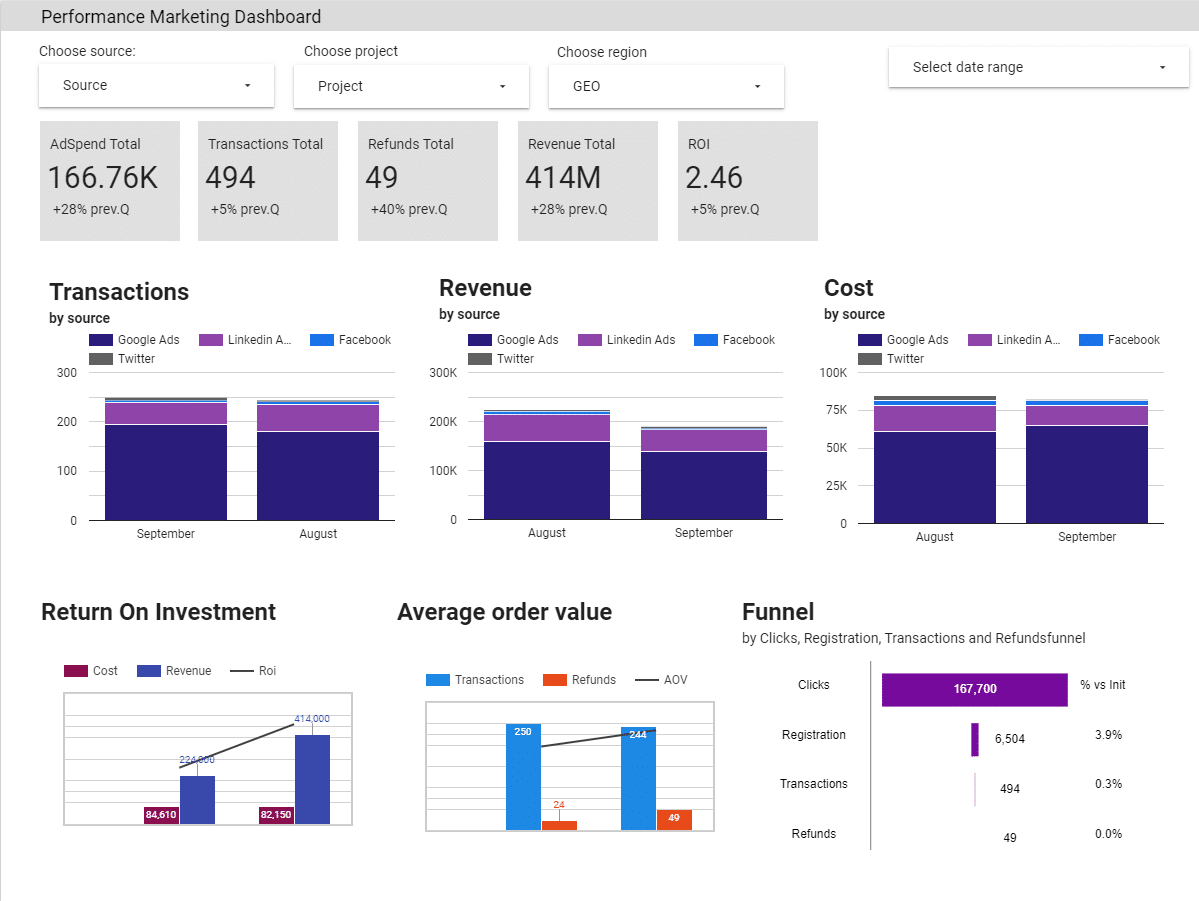
Source: improvado.io
Digital Marketing Dashboard
A digital marketing dashboard is used to monitor the performance of a firm’s digital marketing activities. You can keep a check on the performance and returns of every digital marketing channel.
It becomes easy to identify what channels and strategies are working and what are not. You can optimize the spending accordingly to generate the highest returns.
If you are looking for a marketing dashboard that provides you real-time customer journey analytics and helps you learn the behavior, channels, and touchpoints of the most qualified leads, try Salespanel.
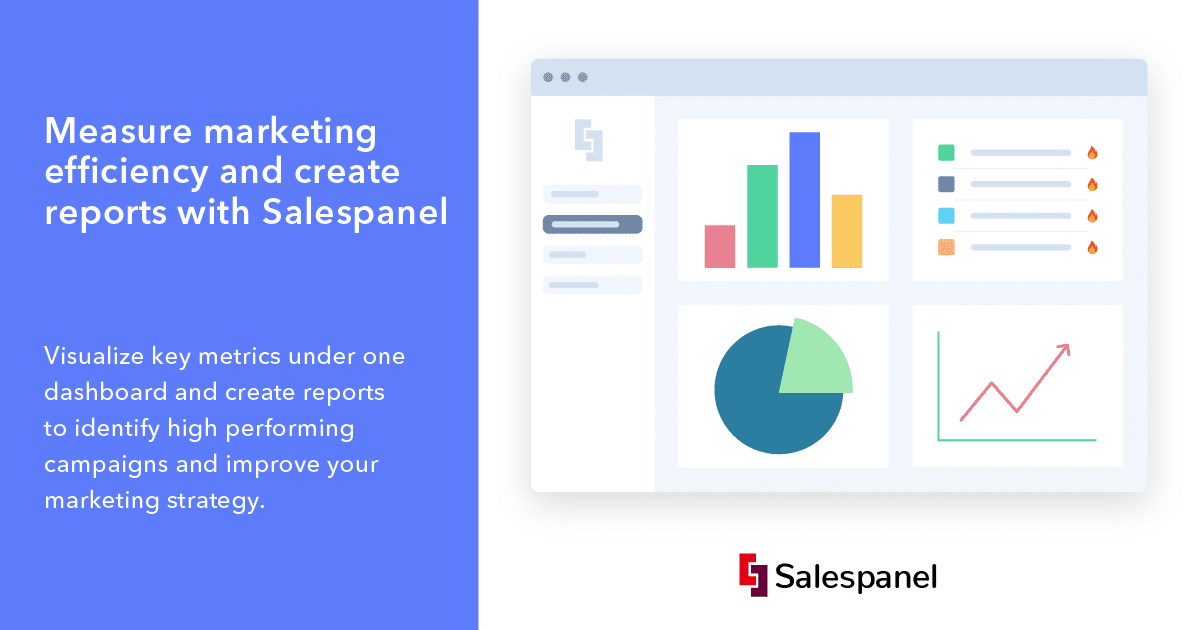
SEO Analytics Dashboard
SEO is an important marketing function. A lot of organic traffic is driven to a firm’s website with a good SEO strategy. An SEO analytics dashboard monitors how the optimizations are performing.
SEO KPIs provide insight into how the overall SEO performance is. These insights can help identify issues and opportunities for more improvements. One can track the progress of SEO activities over time with a single dashboard element.
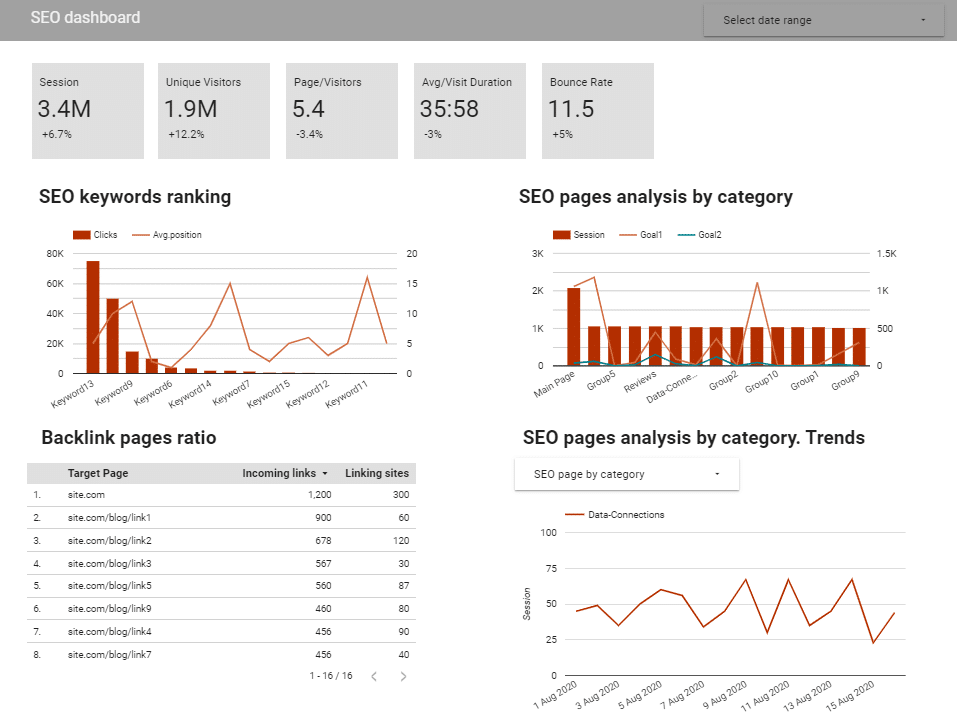
Source: improvado.io
Web Analytics Dashboard
Your website is at the core of all your digital marketing activities. This necessitates monitoring the on-website marketing performance. With a web analytics dashboard, you can track all website marketing performance KPIs in one place.
Pageviews, average session time, on-page conversions, unique visitors, user experience, etc. are the KPIs necessary for this.
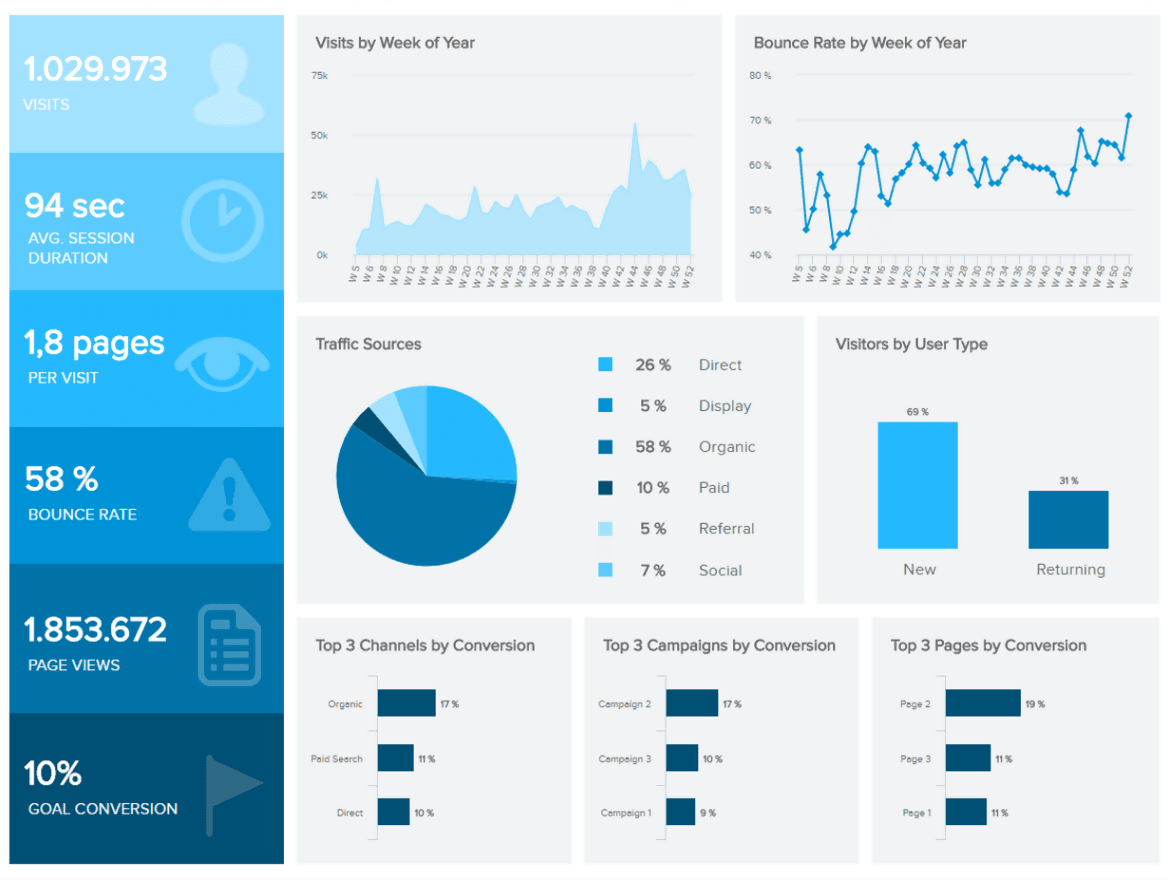
Source: improvado.io
Social media marketing has become a big part of a firm’s marketing operations. It becomes difficult to track marketing performance across different social media channels. A social media marketing dashboard aims to solve this problem.
With KPIs such as views, likes, shares, positive impressions, comments, level of engagement, click, etc. it becomes easy to track campaign performance across channels. With these insights, you can identify what works best for you and leverage it.
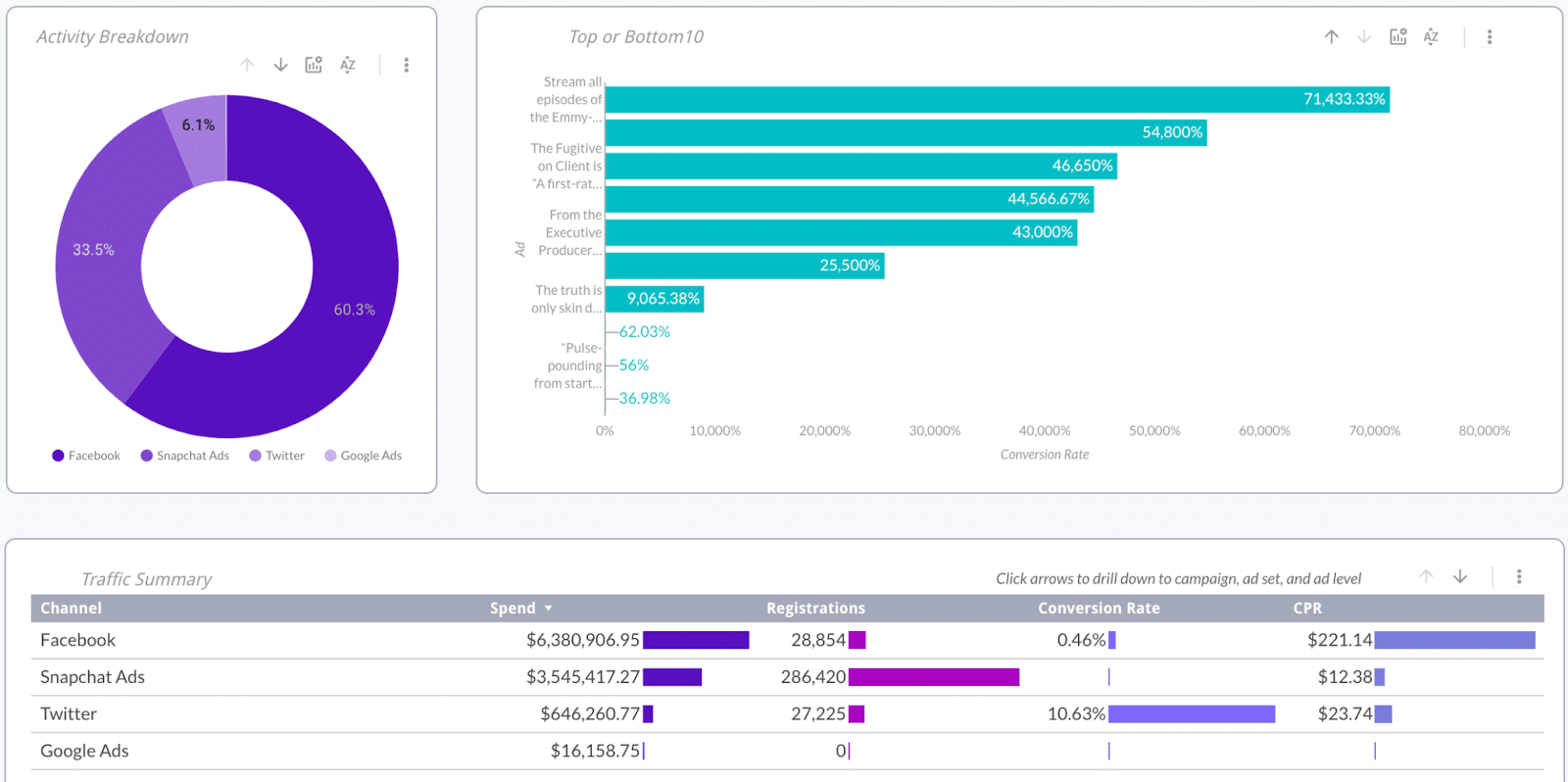
Source: improvado.io
Email Marketing Dashboard
An email marketing dashboard displays the performance and returns that an email marketing campaign is generating. Ideally, you would get this data from your emailing tool itself.
You can easily run A/B Testing when you have easy access to all of these performance KPIs while identifying elements that produce good results. These can be combined in future campaigns to increase overall performance.
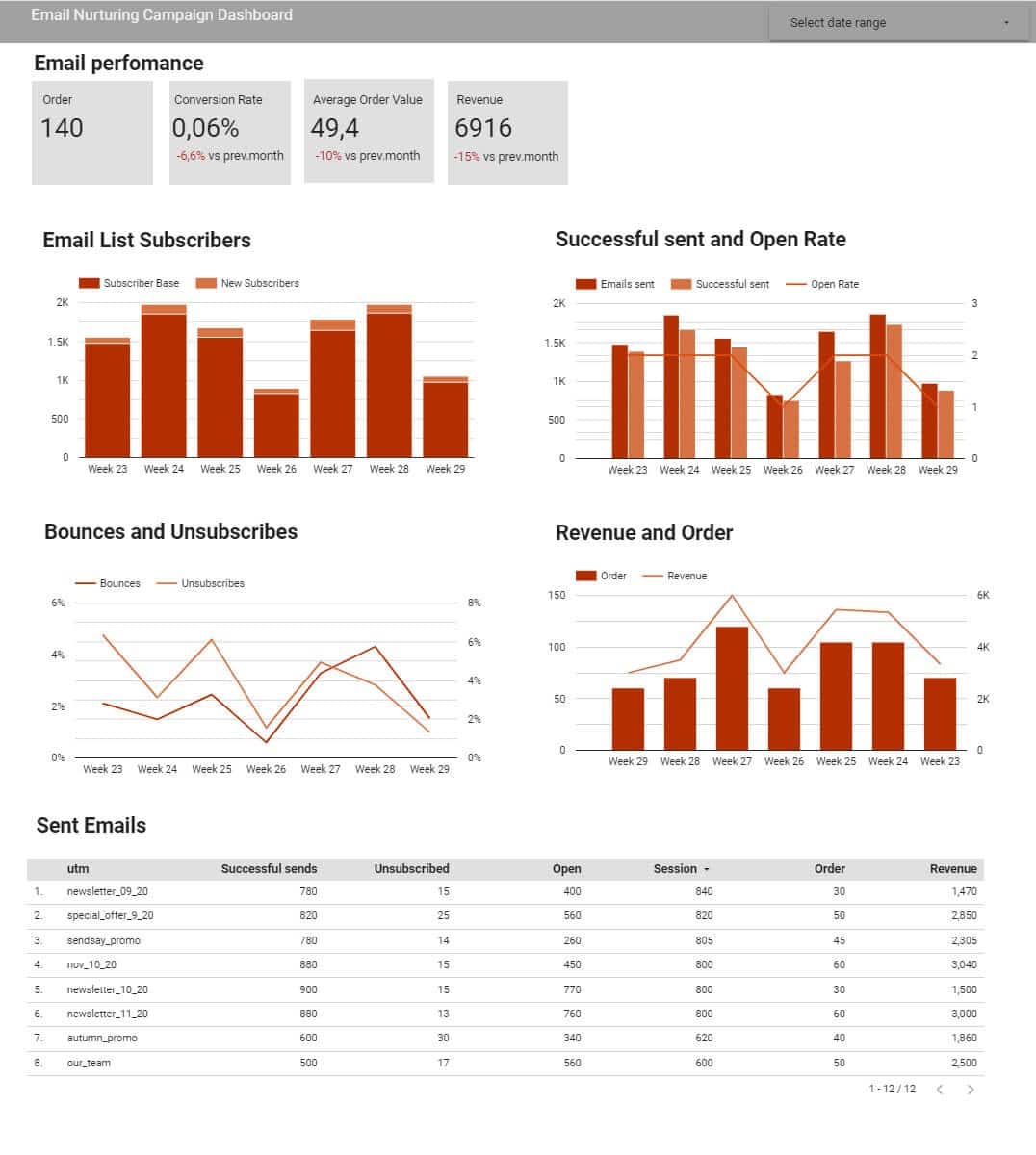
Source: improvado.io
eCommerce Marketing Dashboard
eCommerce Platforms are effective at providing brands with reach and exposure. However, marketing works differently here compared to social media or web adverts.
With an eCommerce marketing dashboard, you can track a lot of necessary KPIs that will help you market better. You can control the price, run limited-time deals, offer coupons, and discounts at the right time to attract customers.
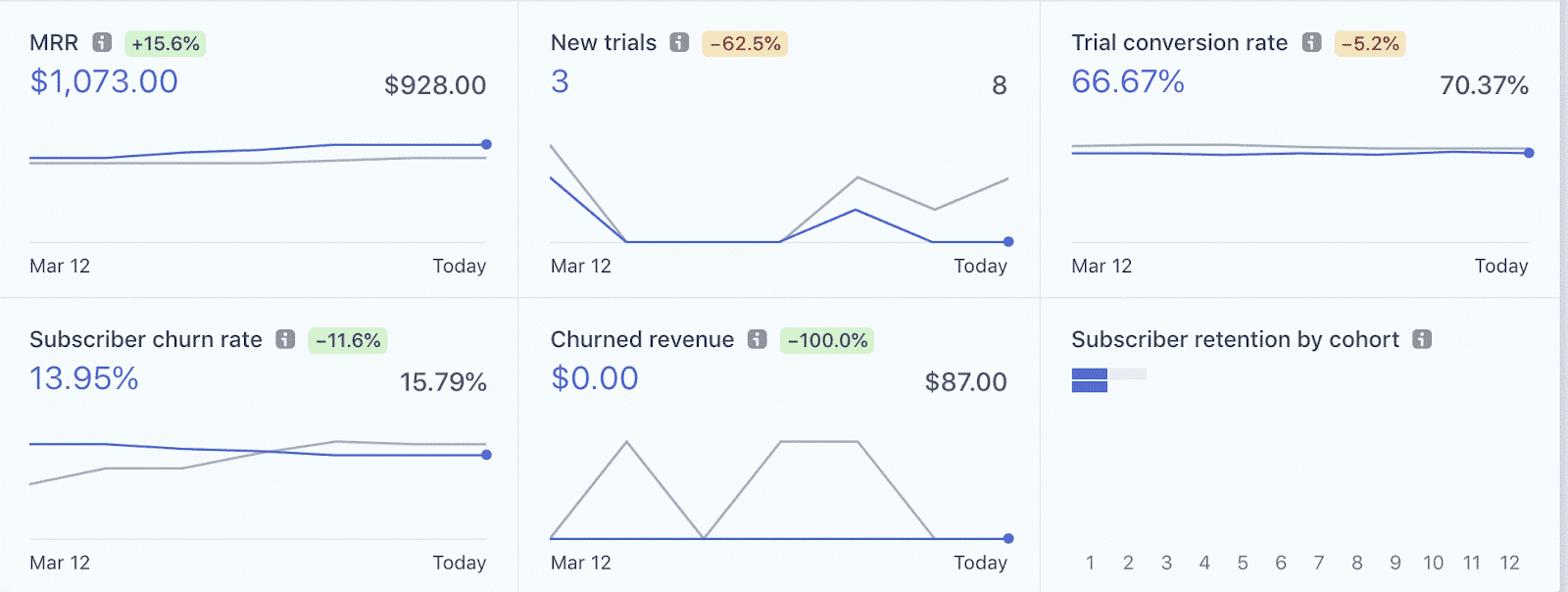
Source: improvado.io
Getting Your Own Marketing KPI Dashboard
Creating a custom marketing KPI dashboard consumes time and resources. As it is an exact fit for your requirements, the investment is justified. You can also use prebuilt solutions. One such, for marketing analytics, is Salespanel. For SEO, you can use a tool like Ahrefs. Your email marketing software would provide its own dashboard and you can get similar dashboards from other products you use.
You can also invest in creating a fully customizable marketing KPI dashboard that suits your B2B business’s unique requirements.
Conclusion
A marketing KPI dashboard is a powerful performance monitoring tool. It enables and aids executives to make quick and accurate decisions.
Data and analytics-driven decisions result in better marketing performance and operational efficiency. With a marketing KPI dashboard, any user can understand what all is happening and how the marketing operation is performing.
Having all these insights and understanding availability at a glance makes your marketing more agile. You can easily react to sudden market changes and gain a competitive advantage.
Sell more, understand your customers’ journey for free!
Sales and Marketing teams spend millions of dollars to bring visitors to your website. But do you track your customer’s journey? Do you know who buys and why?
Around 8% of your website traffic will sign up on your lead forms. What happens to the other 92% of your traffic? Can you identify your visiting accounts? Can you engage and retarget your qualified visitors even if they are not identified?


